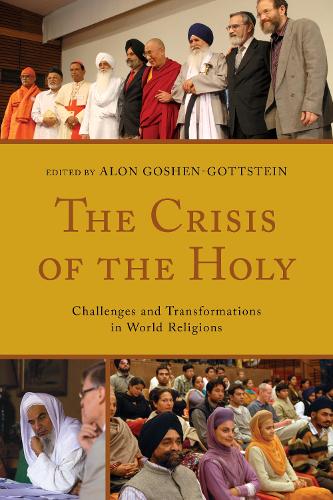
The Crisis of the Holy: Challenges and Transformations in World Religions
(Hardback)
Publishing Details
The Crisis of the Holy: Challenges and Transformations in World Religions
By (Author) Alon Goshen-Gottstein
Contributions by Vincent J. Cornell
Contributions by Alon Goshen-Gottstein
Contributions by Sidney H. Griffith
Contributions by Maria Reis Habito
Contributions by B. Barry Levy
Contributions by Deepak Sarma
Contributions by Michael von Brck
Bloomsbury Publishing PLC
Lexington Books
12th November 2014
United States
Classifications
Tertiary Education
Non Fiction
Philosophy of religion
Social groups: religious groups and communities
Spirituality and religious experience
201
Physical Properties
Hardback
178
Width 162mm, Height 235mm, Spine 18mm
408g
Description
All religions are experiencing rapid changes due to a confluence of social and economic global forces. The modern world threatens the foundations of the worlds religions and the cohesive assurances of their societies. Factors such as the pervasive intrusion of globalizing political and economic developments; polarized and morally equivalent presentations seen in the media; the sense of surety demanded in and promised by a culture dominated by science are but some of the factors that have placed extreme pressure on all religious traditions. This has stimulated unprecedented responses by religious groups, ranging from fundamentalism to the syncretistic search for meaning. The totality of pressures and responses is pushing religious people into controversial forms. As religion takes on new forms, balances between individual and community are disrupted and reconfigured. Religions often lose the capacity to recall their ultimate purpose or to lead their adherents towards it. This is why we call this complex situation the crisis of the holy. This crisis is a confluence of threats, challenges, and opportunities for all religions. The present volume explores the contours of pressures, changes, and transformations, and reflects on how all our religions are changing under the common pressures of recent decades. By identifying commonalities across religions as they respond to these pressures, it suggests how religious traditions might cope with these changes and how they might join forces in doing so.
Reviews
The Crisis of the Holy makes an important and original contribution to a field that has been well researched and written aboutthe impact of modernity on religion. By adopting a double perspectivethat of an external, observation-based one and an internal, reflective and theologically oriented one, the collection breaks new ground concerning the possibility of new creative and meaningful forms of religion emerging out of the modern 'crisis of the holy.' -- Shlomo Fischer, The Hebrew University of Jerusalem
Author Bio
Alon Goshen-Gottstein is founder and director of the Elijah Interfaith Institute. A noted scholar of Jewish studies, he has held academic posts at the Hebrew University of Jerusalem and Tel Aviv University and has served as director of the Center for the Study of Rabbinic Thought, Beit Morasha College, Jerusalem.
